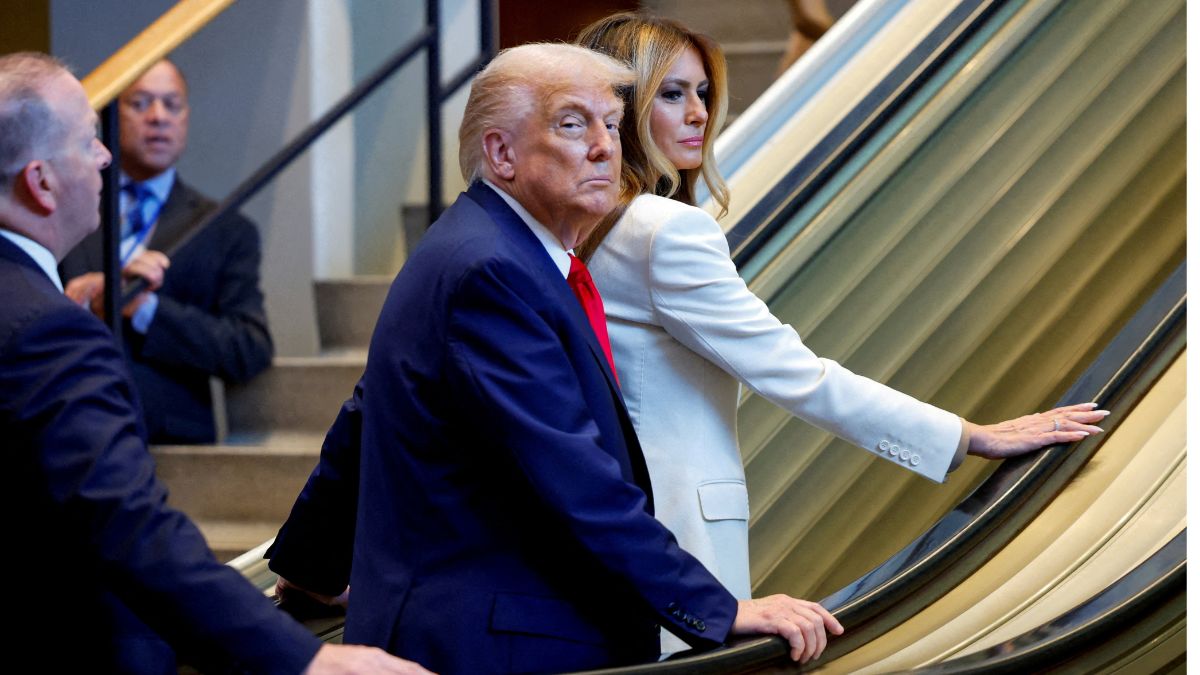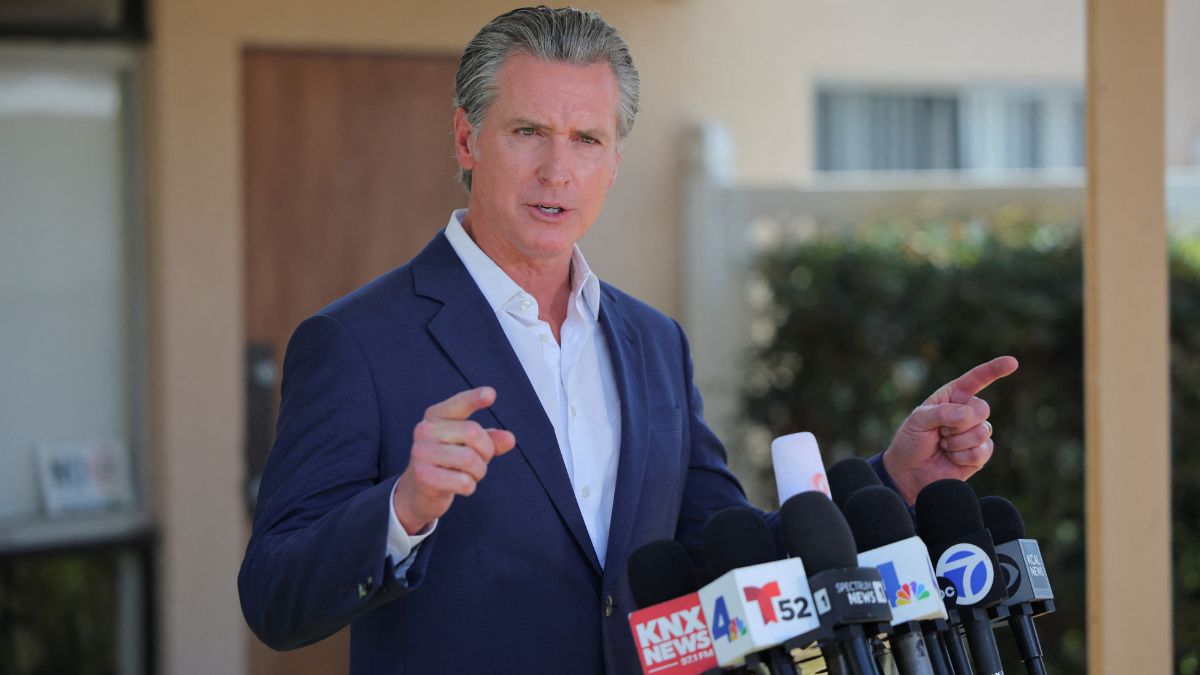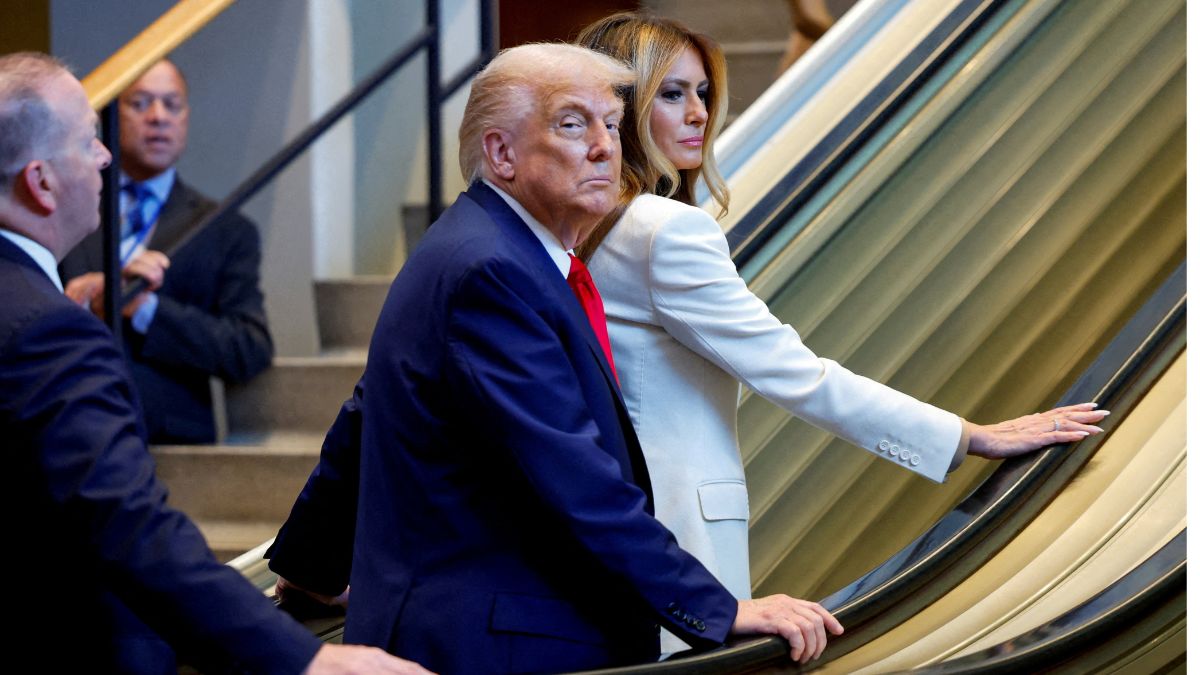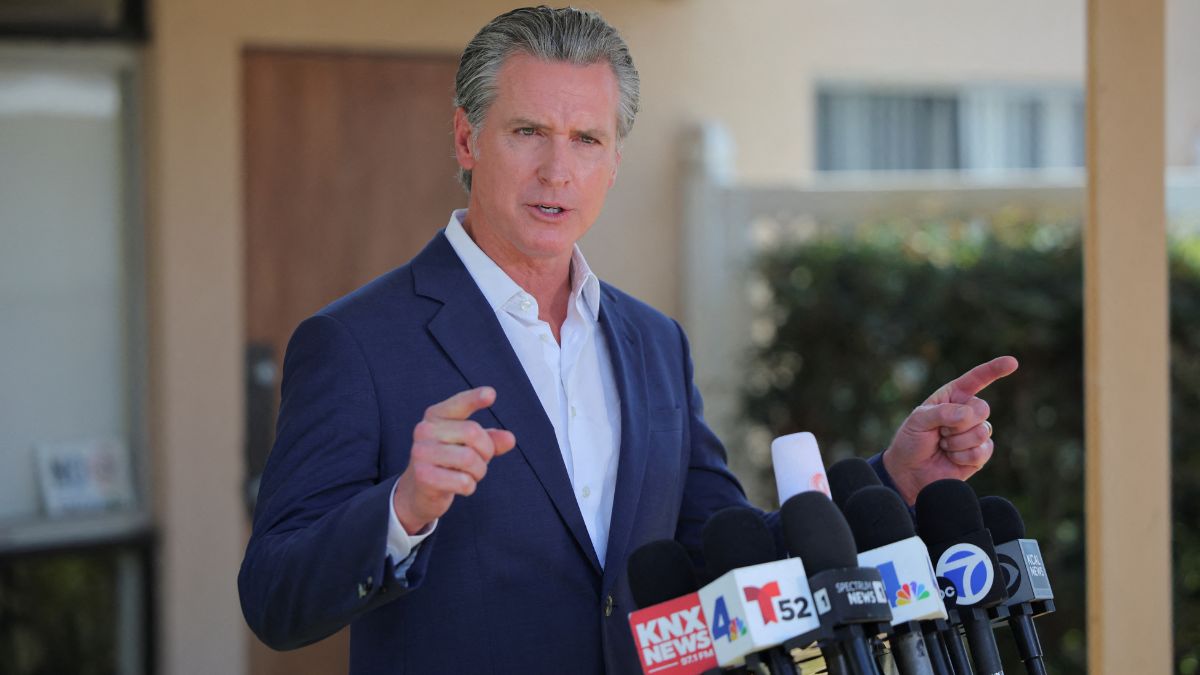At the United Nations summit convened by France and Saudi Arabia ahead of the UN General Assembly (UNGA) in New York City on Monday, several nations decided to recognise a Palestinian state and rally support for a two-state solution.
France, Andorra, Belgium, Luxembourg, Malta and Monaco moved to recognise Palestinian statehood. A day earlier, the UK, Australia, Canada and Portugal joined them, taking the number of nations that recognise Palestine to 156 of the 193 UN member states (around 80 per cent).
“We have gathered here because the time has come. It falls on us, this responsibility, to do everything in our power to preserve the possibility of a two-state solution,” French President Emmanuel Macron said. “Today, I declare that France recognises the state of Palestine.”
The summit was the result of the September 12 UNGA New York Declaration, proposed in a July conference convened by France and Saudi Arabia. The declaration called for ending the Gaza War via a permanent ceasefire, a peaceful settlement of the question of Palestine and the implementation of the two-state solution by unifying the Gaza Strip and the West Bank.
The latest decision is being hailed as a big move, especially by the international media, in the face of staunch opposition by the US and Israel against Palestinian statehood and a two-state solution.
Impact Shorts
More ShortsSymbolically, the move is decisive considering that France, the UK and Australia are steadfast American allies. The latest diplomatic push also comes at a time as Israel continues with its latest military operation against Gaza City to finish off Hamas.
Since the Israel-Hamas War started in October 2023, more than 65,000 Palestinians have been killed, famine has gripped the coastal enclave, 90 per cent of homes have been destroyed and 1.9 million people displaced with many families twice.
US opposes Palestinian statehood
The US remains the only UNSC permanent member not to recognise Palestine after France’s and the UK’s announcement.
The first step towards a two-state solution is the recognition of Palestine as a state. If the US seriously supported the idea of the coexistence of Israel and an independent Palestine, it would have recognised Palestinian statehood long ago.
However, Israel, especially under Benjamin Netanyahu—the longest-serving PM—has vociferously opposed Palestinian statehood and a two-state solution. The US, with its unwavering support, has been complicit in thwarting any such move.
Israel’s UN ambassador, Danny Danon, termed the latest summit a “circus”. “We think it’s actually rewarding terrorism,” he told the media last week.
Netanyahu was livid. “I have a clear message to those leaders who recognise a Palestinian state after the horrific massacre of October 7: You are giving a huge reward to terrorism,” he said in a statement before the summit.
The Israeli PM vowed against the formation of a Palestinian state. “And I have another message for you: It will not happen. A Palestinian state will not be established west of the Jordan River.”
Instead, Bibi vowed to continue expanding settlements in the West Bank. “For years, I have prevented the creation of that terror state against tremendous pressure … Moreover, we have doubled the Jewish settlement in Judea and Samaria, and we will continue on this path.”
The US and Israel had boycotted the French-Saudi UN July conference and voted against the September declaration.
US secretary of state, Marco Rubio, had termed Macron’s plan “reckless” in July. “This reckless decision only serves Hamas propaganda and sets back peace. It is a slap in the face to the victims of October 7th,” he had tweeted.
Both the US and Israel boycotted the latest UN summit.
Moreover, the US barred Palestinian President Mahmoud Abbas and around 80 Palestinian Authority (PA) officials from attending the UNGA summit. The UN had to adopt a resolution backed by 145 member states—six countries abstained and five, including the US and Israel, voted against—last week to allow Abbas to address the UNGA virtually.
The US made its displeasure against the move to recognise Palestine clear. According to the White House, President Donald Trump “ disagrees with American allies recognising a Palestinian state and “believes it is a reward to Hamas”. White House press secretary, Karoline Leavitt, said Trump viewed the move “just more talk and not enough action from some of our friends and allies”.
In his UNGA speech on Tuesday, Trump termed the latest support for Palestinian statehood as a “reward” for Hamas.
“The rewards would be too great for Hamas terrorists for their atrocities … a reward for these horrible atrocities, including October 7, even while they refuse to release the hostages or accept a ceasefire,” he said.
After the failed 2000 Camp David Summit, no US president either hinted at recognising a Palestinian state or made efforts for a two-state solution.
The main reasons for the irreconcilable differences and the failure of the Camp David talks remain: illegal Israeli settlements in the West Bank and East Jerusalem, the status of Jerusalem and Temple Mount (Al-Aqsa) and the potential Israeli control over the airspace and borders of a future Palestinian state.
Even the US stance on a Gaza ceasefire and hostages is sheer hypocrisy, shocking and repugnant. In his UN speech, Trump, expressing concern for the hostages, said, “We have to stop the war in Gaza immediately.”
On the other hand, both under Joe Biden and Trump, the US has vetoed six resolutions calling for an immediate ceasefire.
The latest US double standard was evident this month when the US vetoed a UN resolution calling for an immediate, unconditional and permanent ceasefire in Gaza, lifting all Israeli restrictions on aid deliveries to the Palestinian enclave and unconditional release of all hostages held by Hamas and other groups. Except for the US, all 14 UNSC members voted for the resolution.
It is universally known that Netanyahu’s massive military operation against Gaza City has endangered the lives of the hostages. Despite Israel Defense Forces Chief of Staff Lieutenant General Eyal Zamir’s opposition to the expanded military operation and insistence on a hostage-ceasefire deal, Netanyahu went ahead. Trump, stressing the return of the hostages, tacitly approved the operation.
The US opposes a UN ceasefire because it wants a deal with Hamas on Israeli terms. In case of a UN-backed ceasefire, Israel would have to immediately halt its operations and ultimately withdraw from Gaza—an idea anathema to Netanyahu, fighting for political survival, and his far-right ministers.
Instead, the US has provided military assistance worth billions to Israel, which has used the same weapons, especially warplanes, missiles, bombs and artillery, to kill civilians in every war with Hamas or Hezbollah.
Since its founding, Israel has been the largest recipient of American economic and military aid, totalling around $310 billion with almost $18 billion in direct military assistance since the war with Hamas started. Per a 2016 MoU, the US will provide Israel with $3.8 billion annually through 2028 under the Foreign Military Financing (FMF) programme. Another $500 million is spent annually on joint missile defence programmes, like the Iron Dome, David’s Sling, and Arrow II.
Under the FMF programme, Israel must use to purchase American military equipment and services. The US also made an exception for Israel by allowing it to use a portion of the FMF programme to buy equipment from Israeli defence firms.
Biden only warned Israel about the rising civilian toll in Gaza and paused the supply of 2,000-pound bombs in April 2024. However, in January this year, the State Department informed Congress of a planned $8 billion weapons sale to Israel, including AMRAAMs, 155 mm projectile artillery shells, Hellfire AGM-114 missiles and 500-pound bombs.
Per latest reports, the Trump administration is seeking Congress approval to sell $6.4 billion worth of military equipment to Israel, including 30 Apache air attack helicopters and around 3,250 assault vehicles.
European double-talk on Palestinian statehood
The latest move to recognise Palestine is not only symbolic but also futile. Strangely, Saudi Crown Prince Mohammed bin Salman, a prominent US ally, did not attend the summit despite co-hosting it with Macron.
Without American support, initiative and pressure on Israel, such efforts are meaningless and useless. Trump has made his opposition to such European moves clear. The US will veto any such move when it comes up for a vote at the UNSC.
The US opposition to recognising Palestine and a two-state solution is evident. However, what makes the latest move more ironic and hypocritical is Britain’s history and France’s sudden support for an independent Palestine.
Britain had a significant role in Israel’s creation. In 1917, Britain, guided by strategic and economic interests in the region, issued the Balfour Declaration—the foundation of Israel’s creation and the root cause of the Israel-Palestinian conflict—which called for “the establishment in Palestine of a national home for the Jewish people”. In the same year, British troops captured Jerusalem from the Ottoman Empire.
In 1922, Britain was awarded an international mandate to administer Palestine by the League of Nations. Subsequently, Britain allowed an increasing number of Jews from Europe to migrate to Palestine but also promised an independent Palestine to the Arabs.
On May 14, 1948, Israel was created through a UN plan by giving 56 per cent of British-controlled Mandatory Palestine to Jews and envisaging a Palestinian state on 43 per cent of the land. Arab nations rejected the plan and declared war on Israel, which defeated them and was in control of 78 per cent of the original territory. The remaining land was split between the West Bank, East Jerusalem and Gaza.
So when British PM Keir Starmer said that the UK formally recognised the State of Palestine “to revive the hope of peace for the Palestinians and Israelis, and a two-state solution”, he was trying to correct a historical wrong.
France’s sudden recognition of Palestine is nothing but a part of Macron’s disastrous attempt to be another Charles De Gaulle.
After the departure of Angela Merkel, Macron has been trying desperately to portray himself as the next European leader who can mediate in international crises and chart out Europe’s future without American backing. Macron abysmally failed to convince Russian President Vladimir Putin not to attack Ukraine and to persuade NATO to send troops to counter Russian troops. His proposal to extend the French nuclear umbrella to the whole of Europe to deter Russia was ridiculous and angered Moscow.
Now, Macron is delusional about leading Europe in recognising a Palestinian state and finally a two-state solution despite being aware that his words ring hollow without American and full European support.
France doesn’t even have the support of Germany and Italy, two major European powers that haven’t recognised Palestine. Even among the 32 NATO countries, only 18 have recognised a Palestinian state.
There are two reasons for the sudden change in the diplomatic stance of European nations that have recently recognised Palestine.
First, these nations had only criticised Israel as it started relentlessly and mercilessly bombarding Gaza since October 2023, killing civilians in tens of thousands. When scores of Gazans, especially children—more than 50,00 killed or injured—were being killed daily, the UN declared famine in Gaza and more than a million Gazans were displaced, these European nations didn’t act.
Only Israel’s latest military campaign against Gaza City, aimed at cornering civilians into a shrinking patch of land, prompted these nations to act.
“The man-made humanitarian crisis in Gaza reaches new depths. The Israeli government’s relentless and increasing bombardment of Gaza, the offensive of recent weeks, the starvation and devastation are utterly intolerable,” Starmer said.
Suddenly, the conscience of Britain and France has awakened. They find the new Israeli military operation, the destruction and the starvation in Gaza wrong. They want equal rights for Palestinians in an independent state. They want a ceasefire and an end to the decades-old Israeli-Palestinian conflict.
Europe’s glaring hypocrisy becomes all the more abhorrent in the context of the Russian invasion of Ukraine. The EU slapped massive sanctions on Russia and slammed the capture of a sovereign nation’s land by brute military force.
Second, these European nations are facing growing domestic pressure to recalibrate their position on Israel and Palestinian statehood. Pro-Palestinian rallies calling the Israeli military campaign genocide and ethnic cleansing have become common in several European cities.
Recent public surveys in Europe indicate growing support for recognising Palestine as a state. A [Saudi Crown Prince Mohammed bin Salman is not attending despite co-hosting the event.]YouGov survey in Britain this month showed that 44 per cent of the population wants the UK government to recognise Palestine as an independent state while only 18 per cent disagree.
Despite Germany not recognising a Palestinian state, a YouGov survey in Germany on Tuesday found that 44 per cent of German voters supported such recognition, up from 41 per cent in May 2025 and 40 per cent in June 2024—only 23 per cent opposed recognition.
Therefore, European nations, like Britain and France, are using Palestine to change their policies and project a more united and principled stance globally.
The writer is a freelance journalist with more than two decades of experience and comments primarily on foreign affairs. He tweets as @FightTheBigots. Views expressed in the above piece are personal and solely those of the writer. They do not necessarily reflect Firstpost’s views.


)

)
)
)
)
)
)
)
)



